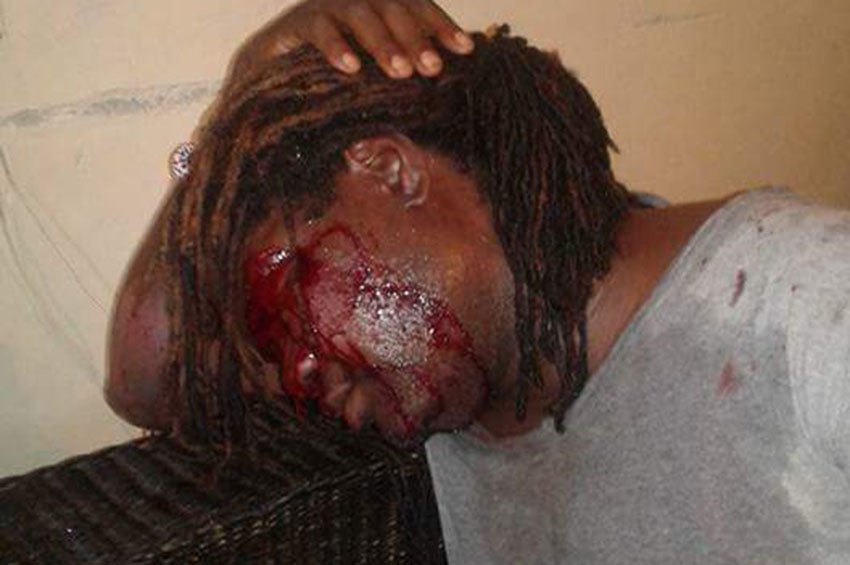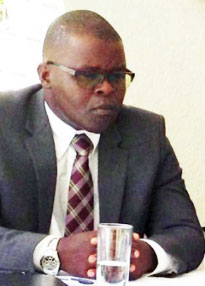In Malawi, the glass is half full (experimental version)
Colin Stewart is a 45-year journalism veteran living in Southern…
Compassionate, progressive thinking is bubbling up even in the world’s conservative, homophobic societies. One example: Malawi in southern Africa, as evidenced in this experimental version of the article “Malawi: Judge seeks renewed gay arrests; gay man attacked.”
The most prominent news in the original article is negative. The following version emphasizes positive aspects of what’s going on there, without deleting the negatives:
Signs of progress, but new challenges, in Malawi

“In all of these countries, there are seeds of hope,” the U.S. state department’s LGBTI rights envoy said at the conclusion of his recent 10-day trip to Malawi, Namibia, Botswana and South Africa.
Randy Berry was not in Malawi to convince the government to accept homosexuality, he said, but to seek an end to discrimination against LGBTI Malawians.
He isn’t alone in that quest.
When Ken Msonda, Peoples Party spokesperson, posted violently anti-gay comments on Facebook, the Malawi Law Society took offense at those statements and filed charges against Msonda in court, while also asking police and the Malawi Human Rights Commission to investigate Msonda’s statements as hate speech, a criminal offense.
The case against Msonda was pushed by the law society, the Centre for Human Rights and Rehabilitation (CHRR) and LGBT rights advocates at the Centre for Peoples Development (CEDEP). Several other civil society organizations expressed interest in joining the case, including Youth and Children Rights Shield (YOCRIS), the Forum for National Development (FND), and the Counseling for the Adolescent Youth Organization (CAYO).
But the case against Msonda was taken over and then discontinued by Mary Kachale, Malawi’s director of public prosecution, who intervened on Jan. 21.

Another sign of progress toward recognition of the human rights of LGBTI Malwaians:
On Jan. 6, President Peter Mutharika took the position that he “wants gay rights protected.” He also proposed a referendum on the country’s anti-gay law — a move that many human rights activists oppose. Their reason: A minority’s human rights should be guaranteed, without depending on whether the minority can win a majority of votes in a referendum.
This week, supporters of Malawi’s moratorium on enforcement of its anti-gay law face new challenges. A gang in central Malawi and a judge in northern Malawi have raised the stakes in that country’s debates over whether to persecute LGBTI citizens or to recognize their human rights.
- In Malawi’s capital, Lilongwe, on Feb. 8, “a group of unidentified men beat up a renowned gay” and left him bleeding from head injuries, the Maravi Post reported.
- In Mzuzu on Feb. 9, High Court Judge Dingiswayo Madise granted an injunction requested by anti-gay pastors seeking an end to the government’s moratorium during court deliberations on the anti-homosexuality law’s constitutionality.
Madise demanded responses from police; from Samuel Tembenu, the minister of justice and constitutional affairs; and from Malawi’s top prosecutor, Kachale, the director of public prosecution. He issued an oddly phrased order restraining police and Kachale “from continuing to cease arresting and prosecuting suspects of homosexuals offenses or offenses relating to carnal knowledge against the order of nature.”
Not every religious leader in Malawi is anti-gay, but many are. The court order was requested by the Young Pastors Coalition of Malawi, which last month had called for the re-arrest of two Malawian men who faced homosexuality charges in December but then were released as the moratorium was reaffirmed.

Kelvin Gomani, the target of this week’s attack, was one of the two men who were arrested Dec. 7 for alleged homosexual activity.
According to Malawi24, the attackers were fellow gays who objected to an alleged offer by Gomani to sell his nine-year-old nephew as a prostitute. According to other accounts, the crowd consisted of heterosexuals who objected to Gomani’s sexual orientation. According to yet another report, the attackers were gay men, motivated by jealousy, who also spread the false story about Gomani and his nephew.
The latest attack came a month after opposition People’s Party spokesperson Msonda posted on Facebook several statements that Malawian gays “are worse than dogs,” that gays and lesbians are “sons and daughters of the devil” and that they should be killed.
The Office of the U.N. High Commissioner for Human Rights expressed fears that the decision to drop charges against Msonda could have serious consequences. In a statement, U.N. Human Rights spokesman Rupert Colville said:
“We are concerned that the failure to prosecute this case sends a dangerous message that inciting others to kill gay people is legitimate and will be tolerated by the authorities—in effect encouraging violent threats and attacks on the gay and lesbian community in Malawi.”
The latest round of Malawian debates about homosexuality began on Dec. 19, when Justice Minister Tembenu reaffirmed the moratorium and announced that charges had been dropped against Gomani and a second defendant.
This article was revised Feb. 12 to incorporate a summary of the account of Gomani’s beating from the Malawi24 article, ” ‘No, he wasn’t beaten for being gay.’ “ It was further revised on Feb. 14 to incorporate the report that Gomani was beaten by jealous gay men.
Related articles
- Stronger voices for LGBT rights in Malawi (Jan. 16, 2016, 76crimes.com)
-

John Suzi-Banda, president of the Malawi Law Society. (Photo courtesy of Nyasa Times) Call for police probe of anti-gay hate speech in Malawi (Jan. 6, 2016, 76crimes.com)
- Msonda faces arrest over gay attack (Jan. 5, 2016, Malawi24)
- PP’s Msonda sticks to his kill gays call despite Malawi Law Society censure (Jan. 5, 2016, Malawi News Now)
- Pastor coalition wants homosexuals re-arrested (Jan. 4, 2015, The Nation)
- Gay Malawian appeals for justice; now he’s in hiding (Jan. 2, 2016, 76crimes.com)
- Gays come out fighting: ‘Kill us or give us our rights’ (Jan. 2, 2016, The Times of Malawi)
- Malawi gay man comes out: ‘Either kill gays or give us rights’ (Jan. 2, 2016, Nyasa Times)
- Malawi drops charges against 2 arrested for gay sex (Dec. 19, 2015, 76crimes.com)
- Malawi outraged as West opposes revival of gay arrests (Dec. 19, 2015, 76crimes.com)
- Malawi arrests came with threats, assault, extortion (Dec. 16, 2015, 76crimes.com)
- Malawi police end moratorium on anti-gay arrests (Dec. 10, 2015, 76crimes.com)
- Malawi is Ready to Legalise Homosexuality’ — Mutharika (July 4, 2015, Malawi24)
- It’s official: No more Malawi arrests under anti-gay laws (July 2014, 76crimes.com)
- 3 in Malawi prisons await ruling on sodomy law (June 2014, 76crimes.com)
- UN joins legal challenge to Malawi’s anti-gay law (January 2014, 76crimes.com)
- Malawi High Court weighs overturning anti-gay law (November 2013, 76crimes.com)





Activists to Indonesian leaders: Stifle anti-LGBT officials